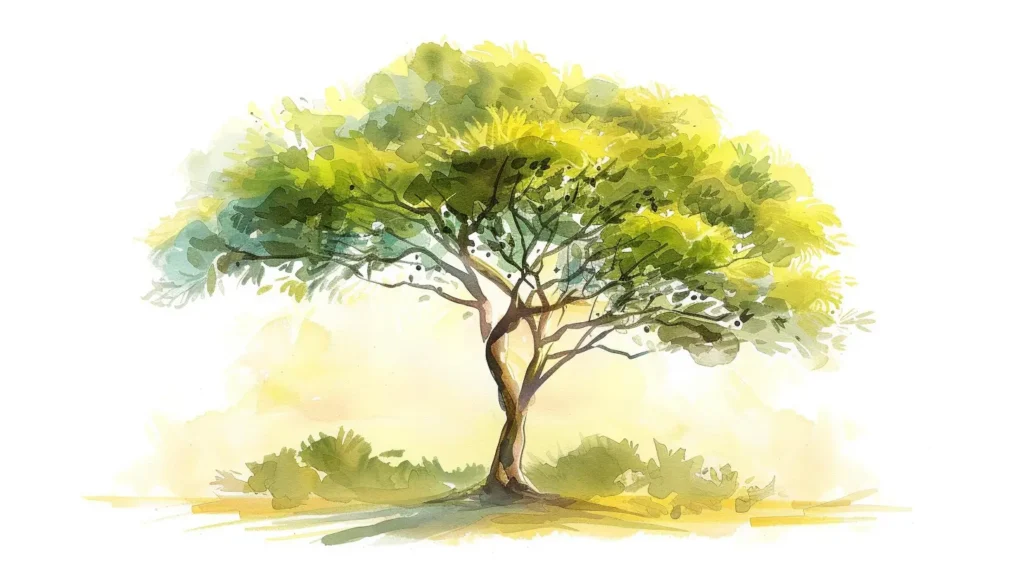
Introduction
The acacia tree, with its graceful branches and delicate leaves, has captivated the human imagination for millennia. Far more than just a beautiful addition to landscapes, the acacia holds deep spiritual significance across various cultures and traditions. In this exploration of the spiritual meaning of acacia trees, we’ll delve into the rich symbolism and profound wisdom this remarkable tree offers to those who seek deeper understanding.
From ancient Egypt to modern spiritual practices, the acacia tree has been revered as a symbol of immortality, resilience, and divine connection. Its ability to thrive in harsh conditions and its use in sacred objects have cemented its place in spiritual lore. Whether you’re curious about dream interpretation, seeking personal growth, or simply fascinated by the intersection of nature and spirituality, the acacia tree has much to teach us.
Key Takeaways
- The acacia tree symbolizes immortality and eternal life in various traditions
- It represents resilience and strength due to its ability to survive in harsh environments
- Acacia wood was used in constructing sacred objects in biblical times
- The tree is associated with protection, purification, and spiritual awareness
- Acacia symbolism spans multiple cultures, including Egyptian, Masonic, and Judeo-Christian traditions
The Immortal Nature of the Acacia

Ancient Egyptian Beliefs
In the sun-baked lands of ancient Egypt, the acacia tree held a place of utmost importance in spiritual beliefs. Known as the “tree of life,” the acacia was thought to be the birthplace of the first gods. This association with divine origins imbued the acacia with powerful symbolism related to immortality and the afterlife.
The Egyptians believed that the acacia possessed the secret to eternal life. Its evergreen nature, thriving even in the harshest desert conditions, reinforced this concept of undying vitality. In Egyptian mythology, the acacia was often depicted in funerary art and rituals, serving as a bridge between the world of the living and the realm of the dead.
Freemasonry and the Immortal Soul
Centuries later, the symbolism of the acacia found its way into Freemasonry, where it continues to hold significant meaning. In Masonic tradition, the acacia serves as a powerful emblem of the immortality of the soul. The tree’s durability and resistance to decay are seen as metaphors for the enduring nature of the human spirit.
When a Freemason passes away, it’s customary to place a sprig of acacia at the grave site. This act symbolizes the belief in life after death and the eternal nature of the soul. The acacia reminds Masons that while the physical body may perish, the essence of a person – their spirit and their good deeds – lives on.
Resilience and Strength: Lessons from the Desert
The acacia’s ability to not just survive but thrive in some of the world’s most unforgiving environments has not gone unnoticed by those seeking spiritual wisdom. In many traditions, the acacia has come to symbolize resilience, endurance, and the strength to overcome adversity.
Consider for a moment the challenges an acacia tree faces in its natural habitat. Scorching heat, minimal rainfall, and poor soil conditions would spell doom for many plants. Yet the acacia stands tall, its roots reaching deep into the earth in search of water, its leaves adapting to conserve moisture.
What lessons can we draw from this remarkable tree? Perhaps the acacia reminds us of our own inner strength – the ability to face life’s challenges head-on and not just survive, but grow stronger in the process. In times of difficulty, we might draw inspiration from the acacia, remembering that even in the harshest “deserts” of our lives, we have the capacity to flourish.
Sacred Connections: The Acacia in Religious Traditions

Biblical Significance
The acacia tree holds a special place in Judeo-Christian traditions, where it’s mentioned several times in the Bible. Most notably, acacia wood was chosen for the construction of sacred objects, including the Ark of the Covenant and the Tabernacle.
Why was acacia wood selected for these holy purposes? Its durability and resistance to decay made it an ideal material for objects meant to last generations. But beyond its practical qualities, the choice of acacia wood for these sacred items imbued the tree with spiritual significance.
Some scholars suggest that the use of acacia wood symbolizes the incorruptible nature of divine truth. Just as the wood resists decay, so too do spiritual truths remain constant and unchanging through time.
The Burning Bush Connection
In some traditions, the acacia is associated with the burning bush through which God spoke to Moses. While the exact species of the burning bush isn’t specified in biblical texts, some interpretations point to the acacia as a likely candidate.
This connection further elevates the spiritual status of the acacia, linking it directly to divine communication. It suggests that the acacia can serve as a conduit between the earthly and the divine – a bridge between human consciousness and higher realms of spiritual awareness.
Protection and Purification: The Acacia’s Spiritual Powers
Many spiritual traditions attribute protective and purifying properties to the acacia tree. In some practices, acacia is believed to ward off negative energies and evil spirits. This protective quality makes acacia a popular choice for talismans and amulets.
The smoke from burning acacia wood or leaves is used in purification rituals in certain cultures. This practice is thought to cleanse spaces of negative influences and create a pure environment for spiritual work.
How might we incorporate this aspect of acacia symbolism into our lives? Perhaps by visualizing the protective energy of the acacia when we feel vulnerable, or by using acacia-based products in our personal cleansing rituals. The key is to connect with the intention behind these practices – the desire for protection and purity in our spiritual journey.
Renewal and Transformation: The Cycle of Life

The acacia tree, with its cyclical patterns of growth, flowering, and seed dispersal, has come to symbolize the concepts of renewal and transformation in many spiritual traditions. It represents the eternal cycle of life, death, and rebirth.
In spring, many acacia species burst into bloom, covering themselves in a profusion of delicate flowers. This annual display of renewal can be seen as a metaphor for our own capacity for personal growth and transformation. Just as the acacia tree renews itself each year, we too have the ability to shed old patterns and beliefs, making way for new growth and understanding.
The acacia’s symbolism of renewal extends to the idea of new beginnings. In times of change or transition, meditating on the image of an acacia tree might help us connect with our inner strength and adaptability, reminding us of our capacity to flourish in new circumstances.
Enhancing Spiritual Awareness: The Acacia’s Psychic Connection
Some spiritual practitioners believe that the acacia tree has the power to enhance spiritual awareness and psychic abilities. This belief may stem from the tree’s association with divine communication (as in the burning bush story) and its use in sacred objects.
In certain traditions, working with acacia – whether through meditation, using acacia-based products, or simply spending time in the presence of the tree – is thought to open up channels of spiritual perception. It’s believed to help quiet the mind and attune one’s consciousness to subtle energies and spiritual insights.
While these claims aren’t scientifically verifiable, they speak to the profound impact the acacia has had on human spiritual imagination. Whether or not we believe in its psychic-enhancing properties, contemplating the acacia and its rich symbolism can certainly lead us to deeper self-reflection and spiritual contemplation.
Divine Wisdom: The Acacia as the Tree of Knowledge
In Arabian folklore, the acacia was known as the “Tree of Knowledge.” This association links the acacia with divine wisdom and understanding. The idea of a tree embodying knowledge is a powerful archetype found in many cultures, perhaps most famously in the biblical Tree of Knowledge of Good and Evil.
What might the acacia teach us about wisdom? Perhaps its lesson lies in its adaptability – the wisdom to change and grow in response to our environment. Or maybe it’s in the tree’s deep roots, reminding us that true wisdom comes from being grounded and connected to our source.
Love and Devotion: The Acacia’s Softer Side
While much of acacia symbolism focuses on grand spiritual concepts like immortality and divine wisdom, the tree also has associations with more tender human emotions. In some European traditions, acacia flowers are given as a symbol of love and affection.
This romantic association adds another layer to the acacia’s spiritual meaning. It reminds us that spirituality isn’t just about lofty ideas and mystical experiences – it’s also about the very human experiences of love, connection, and devotion.
FAQ
Q: What does the acacia tree symbolize in dreams?
A: In dreams, the acacia tree often symbolizes immortality, resilience, and spiritual growth. It may indicate a need for inner strength or a connection to higher wisdom.
Q: How can I incorporate acacia symbolism into my spiritual practice?
A: You can meditate on acacia imagery, use acacia-based products in rituals, or simply spend time with acacia trees in nature to connect with their spiritual energy.
Q: Are all species of acacia trees considered spiritually significant?
A: While some species hold more traditional significance, most acacia species share similar symbolic meanings due to their common characteristics.
Q: Can acacia wood be used for spiritual tools?
A: Yes, acacia wood is often used for making spiritual tools like wands or altar items, drawing on its sacred associations and durability.
Q: Is there a connection between acacia trees and astrology?
A: While not traditionally associated with astrology, some modern practitioners link acacia energy with signs known for resilience and wisdom, like Capricorn or Sagittarius.
Conclusion
As we’ve explored, the spiritual meaning of the acacia tree is rich and multifaceted, spanning cultures and traditions across the globe. From its associations with immortality and resilience to its connections with divine wisdom and love, the acacia offers a wealth of symbolic significance for those on a spiritual journey.
Whether you encounter the acacia in dreams, meditation, or the natural world, remember the deep wisdom this tree embodies. Let its strength inspire you in times of challenge, its renewal remind you of your capacity for growth, and its enduring nature connect you to the timeless aspects of existence.
In our modern world, often disconnected from nature, the acacia tree stands as a powerful reminder of the spiritual lessons we can learn from the natural world. By contemplating the acacia and its meanings, we open ourselves to a deeper understanding of our place in the grand tapestry of life.
What aspects of the acacia’s spiritual significance resonate most with you? How might you incorporate these teachings into your own spiritual practice or daily life? The wisdom of the acacia awaits those who approach it with





